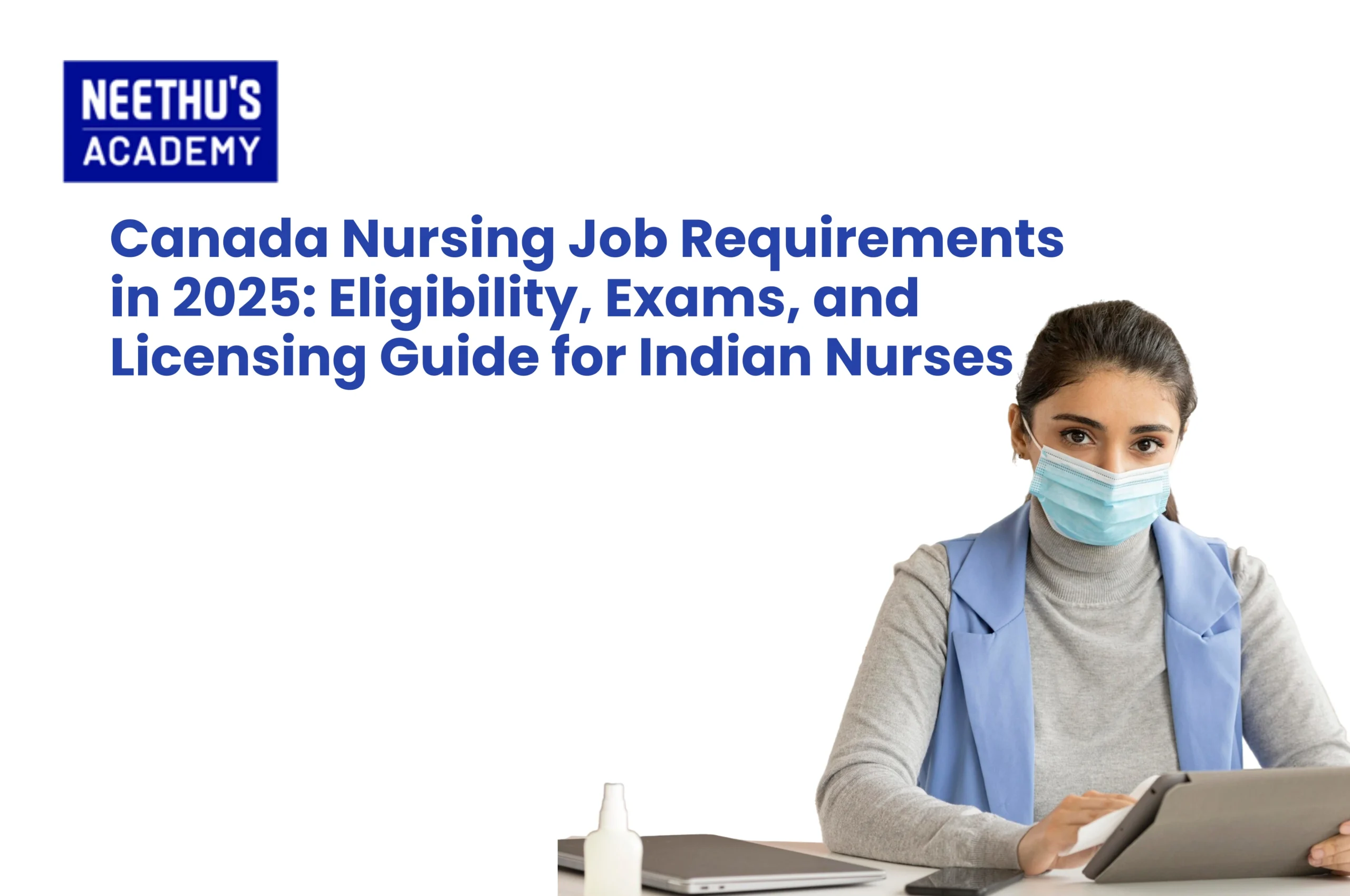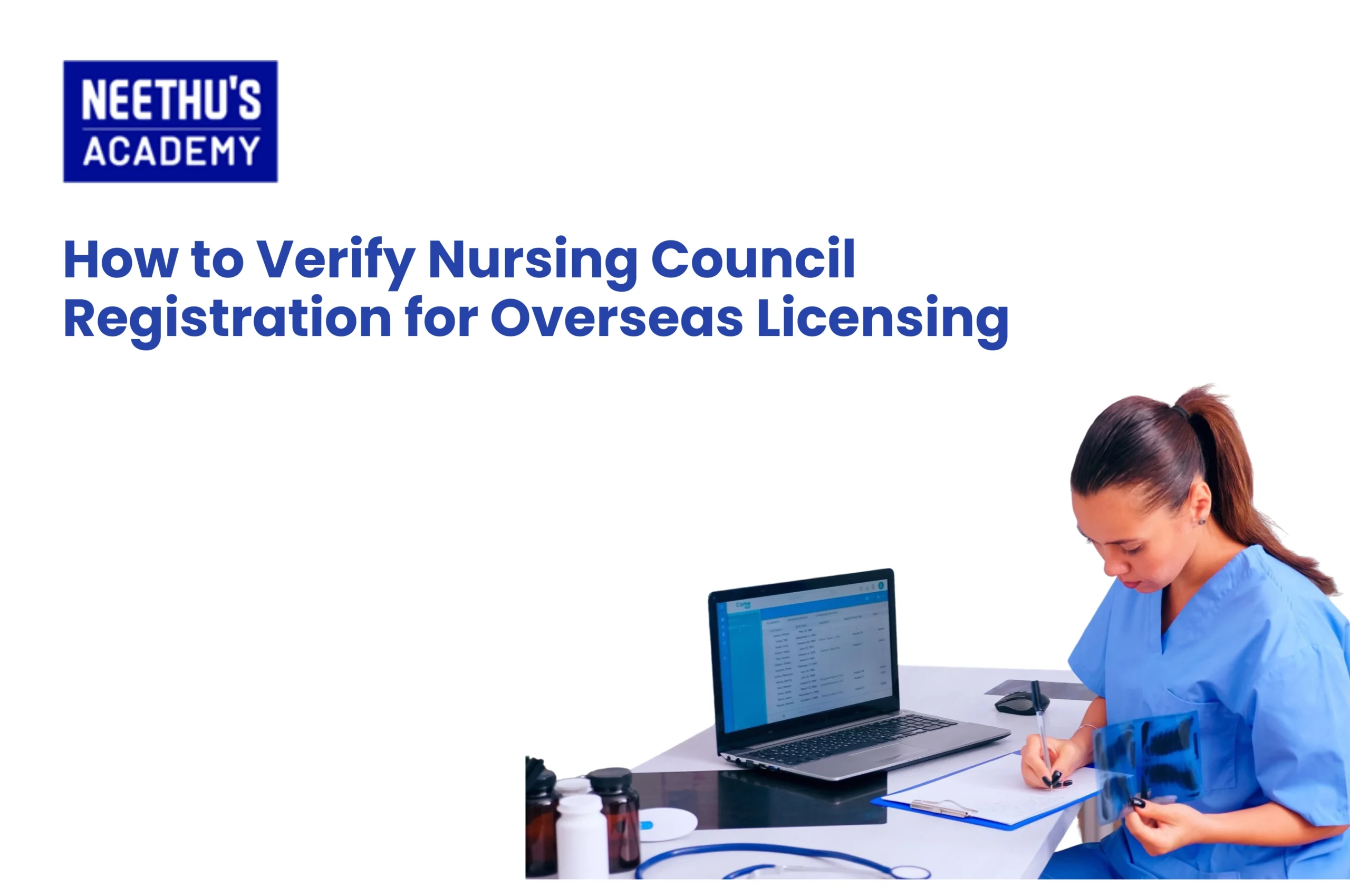The NCLEX-RN exam is one step in a nurse's career that holds a great stake and, at times, not very easy outcomes.…

Canada Nursing Job Requirements in 2025: Eligibility, Exams, and Licensing Guide for Indian Nurses
Canada has emerged as one of the most preferred countries for Indian nurses to work in during the past few years. Boasting high demand for healthcare professionals, good salaries, and transparent channels to Permanent Residency (PR), Canadian nursing not only brings career advancement but also job security. To become a registered nurse in Canada, though, one must learn the Canada nursing job requirements, which consist of satisfying the eligibility conditions, passing licensing exams, and adhering to immigration requirements.
This blog is a step-by-step tutorial on the eligibility requirements for Canadian nurses, licensing tests such as NCLEX, IELTS/OET requirements for Canada nursing positions, and immigration.
Why Canada is a Top Destination for Nurses
Indian nurses are still opting for Canada for various reasons:
* Nurse demand is high: With an aging population and shortfalls in staff, Canadian hospitals and care homes are looking to recruit international nurses actively.
* Competitive wages: Canadian registered nurses have an average yearly income of CAD 70,000–100,000 based on the province.
* Permanent Residency chances: Most provinces include nursing in the priority occupation list under Express Entry and Provincial Nominee Programs.
* Quality of life: Canada provides a secure environment, cosmopolitan culture, and high-quality education for families.
Nursing in Canada provides a secure job, career advancement, and an easy PR route
Basic Eligibility Requirements
Indian nurses should satisfy certain minimum conditions before they apply for nursing positions in Canada.
Educational Qualification
B.Sc. Nursing is preferred.
GNM diploma holders can also apply but will have to undergo some additional bridging courses in Canada.
Work Experience
Although not always required, 1–2 years of work experience within a clinical environment enhances your possibility of successful evaluation and placement.
Language Proficiency
Nurses need to demonstrate English (or French, in Quebec) proficiency.
* IELTS Academic: At least 7 in speaking, 6.5 in writing, 7 in listening and reading (CLB 7+ equivalent).
* OET: Minimum of Grade B in all modules is accepted by a few Canadian provinces.
These requirements ensure that you can go ahead with the licensing and immigration process.
Licensing Process in Canada
For foreign nurses, acquiring a Canadian nursing license is the most important process. The procedure involves:
National Nursing Assessment Service (NNAS)
* Internationally educated nurses (IENs) are required to apply to NNAS.
* You have to provide documents like transcripts, nursing registration, and employment history.
* NNAS assesses your education and compares it with Canadian education standards.
2. NCLEX-RN Exam Requirement
* After verification through NNAS, nurses need to sit for the NCLEX-RN exam (National Council Licensure Examination for Registered Nurses).
* It is the licensing examination required in order to practice as a registered nurse in Canada.
Provincial Registration
* After passing the NCLEX-RN, you have to apply for registration in a province like Ontario, British Columbia, Alberta, or Nova Scotia.
* Every province has its own regulatory body for nurses, and you have to fulfill their own requirements prior to practice.
Language Proficiency Requirements
Language is crucial for practice as a nurse since communication with the patients and healthcare providers is central to all that we do.
* IELTS Academic: The majority of provinces demand at least CLB 7+, equivalent to 7 in speaking, 6.5 in writing, and 7 in reading and listening.
* OET: Some provinces accept an alternative to IELTS, Grade B in all sub-tests.
Scoring Tips
* Regularly practice with mock tests.
* Enhance medical vocabulary to enhance communication skills.
* Enroll in IELTS or OET coaching programs designed for healthcare professionals.
Exams You Need to Clear
Clearing exams is a necessity for working as a nurse in Canada.
NCLEX-RN Exam
* The main license exam for nurses in Canada.
* Assesses knowledge of nursing practice, patient care, and critical thinking.
Bridging Programs (if required)
* If NNAS identifies education deficiencies relative to Canadian standards, nurses can be required to attend a bridging program before becoming eligible for licensure.
* Such programs are made available by universities and colleges in Canada.
Immigration Pathways for Nurses
Once licensing and exam hurdles are overcome, immigration follows. Nurses have several choices:
Express Entry (Federal Skilled Worker Program)
* Nurses can apply for the Federal Skilled Worker Program (FSWP) through Express Entry.
* CRS scores are increased by Canadian job offers and provincial nominations.
Provincial Nominee Programs (PNPs)
* Regions such as Ontario, British Columbia, and Nova Scotia tend to invite nurses through specific PNP draws.
Work Permit vs Permanent Residency
* Nurses can enter on a temporary work permit if they possess a Canadian employment offer.
* Numerous choose to request Permanent Residency (PR) directly through Express Entry or PNP.
Tip: Seeking employment through PNP gives you a higher success rate as nurses are in demand across most provinces.
Other Requirements
Besides exams and immigration, Indian nurses are also required to fulfill other requirements:
* Proof of funds: Show that you have financial resources to sustain yourself in Canada for the initial while.
* Police clearance certificate: Show that you have no criminal record.
* Medical examination: Done by an IRCC-approved physician.
* Adaptation/Orientation training: International nurses in some provinces may be required to undergo adaptation training to familiarize them with the Canadian healthcare system.
Conclusion
Working as a nurse in Canada in 2025 is a good job prospect for Indian nurses, with career development, financial security, and the possibility of settling down with family. To be successful, you should closely adhere to the Canada nursing job requirements, such as satisfying educational qualifications, passing the NCLEX-RN, acquiring the necessary IELTS/OET score, and applying through the appropriate immigration route.
The procedure might look long, but with early planning—particularly for exam preparation and immigration requirements—Indian nurses can achieve a secured future in Canada.
Frequently Asked Questions
A B.Sc. Nursing degree or GNM diploma with valid registration in your home country.
Yes, NCLEX-RN is compulsory for all foreign nurses to secure licensure.
IELTS Academic with CLB 7+ or OET Grade B across all modules.
Not necessarily, but 1–2 years of experience is strongly suggested for increased opportunities.
Related Blogs
- All Posts
- NCLEX-RN
- OET
- Back
- NCLEX - NGN
The NCLEX-RN is more than an exam; it marks the doorway to your career as a registered nurse, testing your readiness to…
Preparing for the Occupational English Test (OET) can be a game-changer for nurses aiming to advance their careers globally. At Neethu’s Academy,…
Course Enquiry
Latest Posts
- All Posts
- canada
- CBT
- DHA
- French
- GENERAL
- German
- Haad
- IELTS
- IQN NEW ZEALAND
- MOH
- NCLEX-RN
- NHRA
- OET
- OSCE
- Pearson Vue
- PROMETRIC
- PTE
- TOEFL
- Back
- NCLEX - NGN
- Back
- OET FOR PHYSIOTHERAPIST
- OET FOR PHARMACIST
- OET FOR DOCTORS



